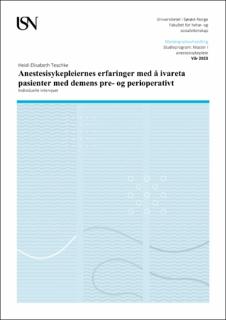| dc.contributor.advisor | Tøien, Mette | |
| dc.contributor.author | Teschke, Heidi Elisabeth | |
| dc.date.accessioned | 2023-07-12T16:41:46Z | |
| dc.date.available | 2023-07-12T16:41:46Z | |
| dc.date.issued | 2023 | |
| dc.identifier | no.usn:wiseflow:6846425:54841702 | |
| dc.identifier.uri | https://hdl.handle.net/11250/3078369 | |
| dc.description.abstract | Temaet for denne masteroppgaven omhandler anestesisykepleiernes erfaringer med å ivareta pasienter med demens pre- og perioperativt og deres oppfatninger om ikke-medikamentelle tilnærminger.
Det vises til at sykehusinnlagte pasienter med demens har en mye større risiko for å utvikle postoperativt delirium enn andre eldre pasienter. Risikoen for postoperativt delirium er også påvirket av stress, angst, størrelsen på det operative inngrepet, ventetid til operasjon, fasting samt bruk av sedativer. Evidensbaserte studier viser positive effekter og resultater ved bruk av ikke-medikamentelle tilnærminger for å begrense bruk av sedasjon, trygge pasienten og redusere stress.
Denne studien belyser anestesisykepleiernes erfaringer, fordi det er de som har hovedkontakt med pasienten både pre- og perioperativt, og det er de som har samlet verdifulle erfaringer med å ivareta pasienter med demens.
Formålet:
Formålet med studien er å få kunnskap om hvordan anestesisykepleiere opplever det pre- og perioperative møte med pasienter med demens, hvilke erfaringer og eventuelle utfordringer de møter i denne settingen og hvordan deres oppfatninger er av ikke-medisinske tilnærminger for å ivareta pasientgruppen.
Målet med studien er å kunne bidra til helsefremmende arbeid ved å øke kunnskapen innen anestesisykepleie om ivaretakelse av pasienter med demens som skal opereres.
Metode:
For å svare på problemstillingen er det benyttet et kvalitativt design, med seks semistrukturerte individuelle intervjuer som metode. Data ble analysert med hjelp av Kirsti Malteruds kvalitative innholdsanalyse.
Resultater:
Det er to aspekter som har utpekt seg: «Ivaretakelse» og «Usikkerhet».
Anestesisykepleiere er opptatt av hvordan de ivareta pasienter med demens uten å krenke dem, men ved å støtte opp deres verdighet i en vanskelig situasjon.
Anestesisykepleiere oppfatter ikke-farmakologiske tilnærminger som egnet til å avlede fra det ukjente og for å trygge pasientene med demens. Pre- og perioperativt bruker anestesisykepleiere fysisk berøring, musikk og verbal- og non-verbal kommunikasjon i ivaretakelse av pasienter med demens. De gir uttrykk for være usikre på om de har gjort riktige vurderinger i forhold til valg av medikamentell behandling versus ikke-medikamentelle tilnærminger perioperativt. Anestesisykepleiere etterlyser tydeligere retningslinjer, for å øke sin kompetanse på å møte pasienter med demens på en best mulig måte i både pre- og perioperativ setting.
Nøkkelord:
Demens, ikke-medikamentelle tilnærminger, musikk, kommunikasjon, anestesisykepleie/ anestesisykepleier, preoperativt/perioperativt, sedasjon, postoperativt delirium | |
| dc.description.abstract | This master’s thesis focuses on the experiences of anesthesia nurses and their perceptions of non-pharmacological approaches, while caring for patients with dementia pre- and perioperatively.
Evidence-based studies shows that hospitalized patients with dementia have a much greater risk of developing postoperative delirium than other elderly patients. The risk of postoperative delirium is also influenced by stress, anxiety, the extent of the operative procedure being undertaken, pre-surgery fasting and length of waiting time, and the use of sedatives. Positive effects and results are shown when using non-pharmacological approaches to limit the use of sedation, while keeping the patient safe and reducing stress.
This study highlights the experiences of anesthesia nurses because they tend to be the ones to have the main contact with the patient both pre- and perioperatively, and because they already have gained valuable experiences in caring for patients with dementia.
Purpose:
The purpose of the study is to gain knowledge about how anesthesia nurses experience the pre- and perioperative meetings with patients with dementia, the possible challenges they face in this setting and their perceptions of non-medicinal approaches when looking after this patient group.
The aim of the study is to contribute to health promoting work by increasing the knowledge within anesthetic nursing about the care of patients with dementia who are to undergo surgery.
Method:
To answer the problem, a qualitative design was used, with six semi-structured individual interviews as the method. Data was analyzed by applying Kirsti Malterud's qualitative content analysis.
Results:
There are two aspects that have been identified: "Care" and "Uncertainty".
Anesthesia nurses are concerned about being able to provide quality care for patients with dementia without offending them, while at the same time they wish to ensure the patients' dignity in what can obviously be a difficult situation both pre- and perioperatively for the patient with dementia.
Anesthesia nurses perceive non-pharmacological approaches as suitable to divert the patients’ attention from the unknown and to reassure the patients with dementia. Pre- and perioperatively, anesthesia nurses use physical touch, music, and verbal and non-verbal communication in caring for patients with dementia.
They express concerns that they are unsure as to whether they are making the correct assessments in relation to the choice of drug treatment versus using non-pharmacological approaches in a per- and perioperative environment.
Anesthesia nurses are calling for clearer guidelines, to increase their competence in managing patients with dementia in the best possible way in both pre- and perioperative settings.
Keywords:
Dementia, non-pharmacological approaches, music, communication, anesthesia nursing, preoperative/perioperative, sedation, postoperative delirium | |
| dc.language | nob | |
| dc.publisher | University of South-Eastern Norway | |
| dc.title | Anestesisykepleiernes erfaringer med å ivareta pasienter med demens pre- og perioperativt | |
| dc.type | Master thesis | |





